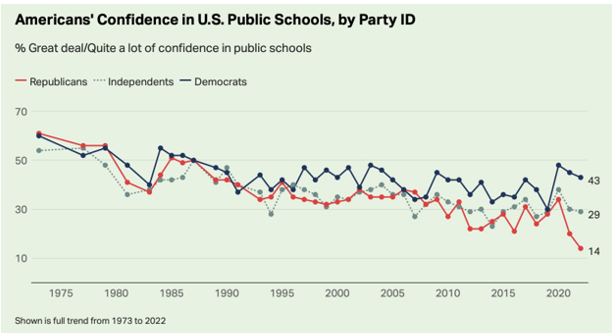 In the film Elvis, Col. Tom Parker, portrayed by Tom Hanks, serves as the Iago-like villain. Parker begins the film by denying rumors that he financially exploited Presley as his manager and that he worked him to death. He didn’t kill Presley, Parker claims, he made him.
In the film Elvis, Col. Tom Parker, portrayed by Tom Hanks, serves as the Iago-like villain. Parker begins the film by denying rumors that he financially exploited Presley as his manager and that he worked him to death. He didn’t kill Presley, Parker claims, he made him.
If anything, Parker implies, you fans killed him. Parker proceeds to serve as both a character and narrator in the tragic tale of the King of Rock and Roll.
Watching Hanks play Parker reminded me of unreliable narrators in the K-12 policy debate, specifically those who are perpetrating an enormous amount of damage to the institution while claiming others are “destroying public education.”

Unlike Elvis, which falls on your author’s very-good-to-almost-great film admiration spectrum, American public education wouldn’t do so well on the Rotten Tomatoes aggregation of critics and public reviews, especially lately. Gallup polling data show the King was still alive during the peak of public confidence in public education, but it’s been sliding ever since. Today, there is bipartisan consensus that we lack confidence in public education by either “a great deal” or “quite a lot.”
No mystery surrounds the recent swoon evident in the Gallup data above: Controversy swirls over COVID-19 school closures, masking and curriculum. Enter Randi Weingarten, president of the American Federation for Teachers, to play the role of Col. Parker.
Given that public education is safely ensconced in every state constitution, no one is going to be “destroying” it. Weingarten, however, has shown an expansive capacity to damage both the system and the students within it. And like Parker, she is anxious to avoid taking responsibility.
Weingarten repeatedly claimed to be “working hard” to reopen schools while lobbying hard to do the opposite. In 2021, Weingarten’s union lobbied the Centers for Disease Control and Prevention on controversial school re-opening guidance, even writing some of the text.
Many school systems both in the United States and across the world had reopened by this point, and many had never closed at all. The guidelines, however, recommended that schools in 90% of American counties adhere to strict guidelines which drew fire from both parents and many scientists.
“Zoom school” provided a window for parents into curriculum, and many did not like what they saw. Battles over public-school curriculum are ongoing, but after COVID-19, they escalated.
Weingarten could have taken the stance that the role of public schools is to teach state academic standards to calm the waters of controversy. Instead, she described parental concerns as “contrived” and claimed that her organization stood ready to defend teachers teaching “real history.”
Meanwhile, the National Education Association approved a resolution to implement Critical Race Theory in K-12 curriculum. I don’t have a dog in this curriculum fight. The way to resolve curriculum fights is to tolerate diversity so that people can choose the types of schools they want. But Randi Weingarten and company oppose that proposition with every fiber of their being. This works to the detriment of teachers, students, and families.
The United States is a pluralistic society and ought to have a pluralistic school system to reflect that reality. The process of having a one-size-fits-all system regarding controversial issues such as student health and curriculum not only is bad for families; it will continue to represent a source of unending cultural conflict.
In the end, you judge a tree by the fruit is produces, and here the record on shut-downs and curriculum wars has produced entirely rotten produce. Public school enrollment dropped by 1.2 million students, and students are demonstrating enormous academic and behavioral deficits.
Years after Presley’s death, a judge ruled that Parker’s management of his business affairs had been “extortionate … unethical and poorly handled.” The same could be said for the education union’s influence over public education.
American families have been caught in a trap of never-ending conflict over public schools, but they can – and many have – walked out. Families ought to be able to access an equitable share of funding when they do so.
Col. Weingarten didn’t kill public school culture wars; she made them.


